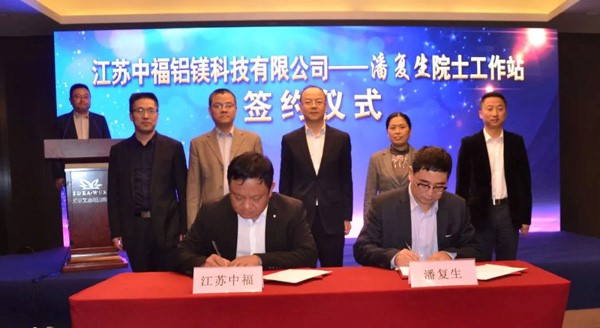
Pan Fusheng (R), academician of the Chinese Academy of Engineering, signs an agreement to cooperate with Jiangsu Zhongfu Aluminum Magnesium Technology Company in Qianzhou subdistrict, Huishan district, Wuxi, April 17. [Photo/WeChat account: wuxifabu2013]
Pan Fusheng, academician of the Chinese Academy of Engineering, recently decided to set up his first academician work station in Qianzhou subdistrict, Huishan district, Wuxi.
In cooperation with Jiangsu Zhongfu Aluminum Magnesium Technology Company, Pan's project is devoted to the development of new high-end aluminium-magnesium alloys and has a total investment of 350 million yuan ($54.6 million). It will be carried out on idle land.
Qianzhou subdistrict has opened a new path for the high-quality development of township industries in South Jiangsu through investment invitations, improvement of land use efficiency and industrial transformation and upgrading.
Thanks to the advanced township industries, Qianzhou ranked among the first batch of towns with an annual GDP of over 100 million yuan ($15.4 million) in the 1980s. However, by 2015, many projects were not able to settle in the town due to its depleting land resources.
Meng Dong, secretary of the Party Working Committee of Qianzhou subdistrict, said some enterprises that had previously obtained land have been operating with outdated technologies, poor product sales, and low land productivity. He said it would be a huge asset if those lands were "vacated".
Under this situation, Zhongfu Aluminum Magnesium Technology Company was founded last year by Xu Ruifu, CEO of the company, in cooperation with the National Research Center for Magnesium Alloys. The company was built at a relatively fast pace and on 4-hectare block of land with factory buildings which had been idle for three years.
According to statistics, last year Qianzhou introduced four projects with a total value of over 100 million yuan and a total investment of 850 million yuan through making use of existing land. Since 2016, the subdistrict has revitalized 281.5 hectares of land and 236,600 square meters of factory buildings through "landless investment invitation".

Seven high-tech enterprises have decided to develop sites in Qianzhou subdistrict, Wuxi. [Photo/WeChat account: wuxifabu2013]
Other blocks of vacant land and factory buildings have recently attracted high-level talents to set up enterprises in Qianzhou, including experts from the national Thousand Talents Program and PhD holders returned from Germany. The site will be established into an incubator for high-level talents and seven high-tech enterprises have decided to locate here with an estimated total annual output value of over 300 million yuan.
"We are quite prudent about introducing projects for every piece of land which has been vacated," said Sun Weibing, who is responsible for investment promotion of Qianzhou subdistrict. He added that due to the strong pressure traditional industries in Qianzhou face in transformation and upgrading, it is necessary to force them in this respect through well-planned invitations to invest.
The industrial structure of Qianzhou has been undergoing changes as a result of the intensified efforts made in the core areas of modern industries, such as scientific and technological talents and capital operations.
Recently, the newly upgraded Cloud Platform of Qianzhou Digital Assets version 2.0 was officially launched to help the township industry to transform toward high-quality development.
Through the cloud platform, Chen Yujie, a local entrepreneur, managed to refine and produce the natural sweetener stevioside together with the Institute of Microbiology of Chinese Academy of Sciences. This enabled Chen to shift from the machinery manufacturing industry to the bio-health sector. The product has been approved by the US Food and Drug Administration and will enter trial production in August.
Wang Ninghai, deputy director of the Qianzhou Sub-district Office, said that high-quality township industrial development requires concerted efforts from enterprises, industries and governments and all must strive to achieve coordinated development in the real economy, technological innovation and attract high-end talents.






